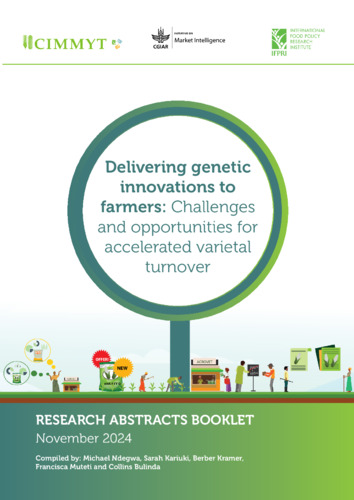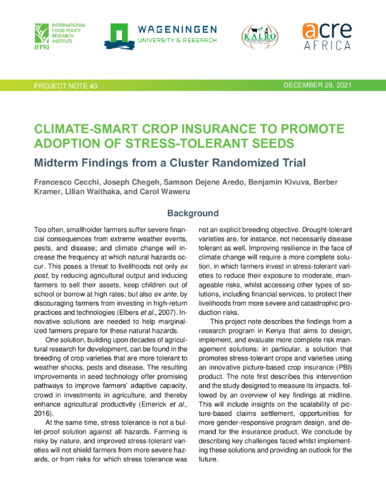Climate-smart crop insurance to promote adoption of stress-tolerant seeds: Midterm findings from a cluster randomized trial
Too often, smallholder farmers suffer severe financial consequences from extreme weather events, pests, and disease; and climate change will increase the frequency at which natural hazards occur. This poses a threat to livelihoods not only ex post, by reducing agricultural output and inducing farmers to sell their assets, keep children out of school or borrow at high rates; but also ex ante, by discouraging farmers from investing in high-return practices and technologies (Elbers et al., 2007). Innovative solutions are needed to help marginalized farmers prepare for these natural hazards. One solution, building upon decades of agricultural research for development, can be found in the breeding of crop varieties that are more tolerant to weather shocks, pests and disease. The resulting improvements in seed technology offer promising pathways to improve farmers’ adaptive capacity, crowd in investments in agriculture, and thereby enhance agricultural productivity (Emerick et al., 2016). At the same time, stress tolerance is not a bullet-proof solution against all hazards. Farming is risky by nature, and improved stress-tolerant varieties will not shield farmers from more severe hazards, or from risks for which stress tolerance was not an explicit breeding objective. Drought-tolerant varieties are, for instance, not necessarily disease tolerant as well. Improving resilience in the face of climate change will require a more complete solution, in which farmers invest in stress-tolerant varieties to reduce their exposure to moderate, manageable risks, whilst accessing other types of solutions, including financial services, to protect their livelihoods from more severe and catastrophic production risks. This project describes the findings from a research program in Kenya that aims to design, implement, and evaluate more complete risk management solutions; in particular, a solution that promotes stress-tolerant crops and varieties using an innovative picture-based crop insurance (PBI) product. The first describes this intervention and the study designed to measure its impacts, followed by an overview of key findings at midline. This will include insights on the scalability of picture-based claims settlement, opportunities for more gender-responsive program design, and demand for the insurance product. We conclude by describing key challenges faced whilst implementing these solutions and providing an outlook for the future.
Authors
Cecchi, Francesco; Chegeh, Joseph; Aredo, Samson Dejene; Kivuva, Benjamin; Kramer, Berber; Waithaka, Lilian; Waweru, Carol
Citation
Cecchi, Francesco; Chegeh, Joseph; Aredo, Samson Dejene; Kivuva, Benjamin; Kramer, Berber; Waithaka, Lilian; and Waweru, Carol. 2021. Climate-smart crop insurance to promote adoption of stress-tolerant seeds: Midterm findings from a cluster randomized trial. Project December 2021. Washington, DC: International Food Policy Research Institute (IFPRI). https://doi.org/10.2499/p15738coll2.134938.
Keywords
Sub-saharan Africa; Africa; Eastern Africa; Insurance; Risk Management; Gender; Women’s Empowerment; Seeds; Technology; Agricultural Insurance; Empowerment; Smallholders; Crop Insurance; Imagery; Information and Communication Technologies; Risk; Climate-smart Agriculture; Climate Change; Women
Project
Policies, Institutions, and Markets







